- Home
- Elizabeth George
In the Presence of the Enemy
In the Presence of the Enemy Read online
CONTENTS
TITLE PAGE
DEDICATION
EPIGRAPH
PART ONE
CHAPTER 1
CHAPTER 2
CHAPTER 3
CHAPTER 4
CHAPTER 5
CHAPTER 6
CHAPTER 7
CHAPTER 8
CHAPTER 9
CHAPTER 10
CHAPTER 11
CHAPTER 12
PART TWO
CHAPTER 13
CHAPTER 14
CHAPTER 15
CHAPTER 16
CHAPTER 17
CHAPTER 18
CHAPTER 19
CHAPTER 20
CHAPTER 21
PART THREE
CHAPTER 22
CHAPTER 23
CHAPTER 24
CHAPTER 25
CHAPTER 26
CHAPTER 27
CHAPTER 28
CHAPTER 29
CHAPTER 30
ACKNOWLEDGEMENTS
ABOUT THE AUTHOR
PREVIEW OF A TRAITOR TO MEMORY
ALSO BY ELIZABETH GEORGE
COPYRIGHT
In loving memory of Freddie LaChapelle
1948-1994
I grant you immortality in the one small
way I can.
Go with God, dearest Freddie.
For neither man nor angel can discern
Hypocrisy, the only evil that walks
Invisible, except to God alone.
JOHN MILTON, Paradise Lost
1
CHARLOTTE BOWEN THOUGHT she was dead. She opened her eyes into cold and darkness. The cold was beneath her, feeling just like the ground in her mother’s garden planter, where the never-stop drips from the outdoor tap made a patch of damp that was green and smelly. The darkness was everywhere. Black pushed against her like a heavy blanket, and she strained her eyes against it, trying to force out of the endless nothing a shape that might tell her she wasn’t in a grave. She didn’t move at first. She didn’t reach out either fingers or toes because she didn’t want to feel the sides of the coffin because she didn’t want to know that death was like this when she’d thought there’d be saints and sunlight and angels, with the angels sitting on swings playing harps.
Charlotte listened hard, but there was nothing to hear. She sniffed, but there was nothing to smell except the mustiness all round her, the way old stones smell after mould’s grown on them. She swallowed and tasted the vague memory of apple juice. And the flavour was enough to make her recall.
He’d given her apple juice, hadn’t he? He’d handed over a bottle with a cap that he’d loosened and shiny beads of moisture speckling its sides. He’d smiled and squeezed her shoulder once. He’d said, “Not to worry, Lottie. Your mum doesn’t want that.”
Mummy. That was what this was all about. Where was Mummy? What had happened to her? And to Lottie? What had happened to Lottie?
“There’s been an accident,” he’d said. “I’m to take you to your mum.”
“Where?” she’d said. “Where’s Mummy?” And then louder, because her stomach felt liquidy all of a sudden and she didn’t like the way he was looking at her, “Tell me where’s my mum! Tell me! Right now!”
“It’s all right,” he’d said quickly with a glance about. Just like Mummy, he was embarrassed because of her noise. “Quiet down, Lottie. She’s in a Government safe house. Do you know what that means?”
Charlotte had shaken her head. She was, after all, only ten years old and most of the workings of the Government were a mystery to her. All she knew for sure was that being in the Government meant that Mummy left home before seven in the morning and usually didn’t come back till after she was asleep. Mummy went to her office in Parliament Square. She went to her meetings in the Home Office. She went to the House of Commons. On Friday afternoons she held surgery for her constituents in Marylebone, while Lottie did her school prep, tucked out of sight in a yellow-walled room where the constituency’s executive committee met.
“Behave yourself,” her mother would say when Charlotte arrived after school each Friday afternoon. She’d give a meaningful tilt of her head in the direction of that yellow-walled room. “I don’t want to hear a peep out of you till we leave. Is that clear?”
“Yes, Mummy.”
And then Mummy would smile. “So give us a kiss,” she would say. “And a hug. I want a hug as well.” And she would stop her discussion with the parish priest or the Pakistani grocer from the Edgware Road or the local schoolteacher or whoever else wanted ten precious minutes of their MP’s time. And she’d catch Lottie up in a stiff-armed hug that hurt. Then she’d swat her bottom and say, “Off with you now,” and turn back to her visitor, saying, “Kids,” with a chuckle.
Fridays were best. After Mummy’s surgery, she and Lottie would ride home together and Lottie would tell her all about her week. Her mother would listen. She would nod, and sometimes pat Lottie’s knee, but all the time she kept her eyes fixed to the road, just beyond their driver’s head.
“Mummy,” Lottie would say with a martyred sigh in a useless attempt to wrest her mother’s attention from Marylebone High Street to herself. Mummy didn’t have to look at the high street after all. It’s not as if she was driving the car. “I’m talking to you. What’re you looking for?”
“Trouble, Charlotte. I’m looking for trouble. You’d be wise to do the same.”
Trouble had come, it seemed. But a Government safe house? What was that exactly? Was it a place to hide if someone dropped a bomb?
“Are we going to the safe house?” Lottie had gulped down the apple juice in a rush. It was a little peculiar—not nearly sweet enough—but she drank it down properly because she knew it was naughty to seem ungrateful to an adult.
“That we are,” he’d said. “We’re going to the safe house. Your mum’s waiting there.”
Which was all that she could remember distinctly. Things had got quite blurry after that. Her eyelids had grown heavy as they drove through London, and within minutes it seemed that she hadn’t been able to hold up her head. At the back of her mind, she seemed to recall a kind voice saying, “That’s the girl, Lottie. Have a nice kip, won’t you,” and a hand gently removing her specs.
At this final thought, Lottie inched her hands up to her face in the darkness, keeping them as near as possible to her body so that she wouldn’t have to feel the sides of the coffin she was lying in. Her fingers touched her chin. They climbed slowly up her cheeks in a spider walk. They felt their way across the bridge of her nose. Her specs were gone.
That made no difference in the darkness, of course. But if the lights went on…Only how were lights to go on in a coffin?
Lottie took a shallow breath. Then another. And another. How much air? she wondered. How much time before…And why? Why?
She felt her throat getting tight and her chest getting hot. She felt her eyes burn. She thought, Mustn’t cry, mustn’t ever ever cry. Mustn’t ever let anyone see…Except there was nothing to see, was there? There was nothing but endless black upon black. Which made her throat tight, which made her chest hot, which made her eyes burn all over again. Mustn’t, Lottie thought. Mustn’t cry. No, no.
Rodney Aronson leaned his kettle-drum bum against the windowsill in the editor’s office and felt the ancient venetian blinds scrape against the back of his safari jacket. He fished in one of the jacket’s pockets for the rest of his Cadbury whole nut bar, and he unwrapped its foil with the dedication of a paleontologist scrupulously removing soil from the buried remains of prehistoric man.
Across the room at the conference table, Dennis Luxford looked completely relaxed in what Rodney called the Chair of Authority. Wit
h a triangular grin on his elfin face, the editor was listening to the day’s final report on what Fleet Street had the previous week dubbed the Rent Boy Rumba. The report was being given, with considerable animation, by the best investigative reporter on staff at The Source. Mitchell Corsico was twenty-three years old—a young man rather idiotically given to cowboy attire—with the instincts of a blood-hound and the tremulous sensitivity of a barracuda. He was just what they needed in the current rich climate of parliamentary peccadilloes, public outrage, and sexual shenanigans.
“According to this afternoon’s statement,” Corsico was saying, “our esteemed MP from East Norfolk declared that his constituency is solidly behind him. He’s innocent until proven and all the et ceteras. The loyal party chairman asserts the entire brouhaha is the fault of the gutter press, who, he claims, are attempting yet again to undermine the Government.” Corsico flipped through his notes in an apparent search for the appropriate quote. Finding it, he shoved his treasured Stetson back on his head, struck a heroic pose, and recited, “ ‘It’s no secret that the media are set on a path to bring down the Government. This rent boy business is merely another attempt by Fleet Street to determine the direction of parliamentary debate. But if the media wish to destroy the Government, the media shall find more than one worthy opponent waiting to do battle from Downing Street to Whitehall to the Palace of Westminster.’ ” Corsico flipped the notebook closed and shoved it into the back pocket of his well-worn jeans. “Lofty sentiment, that, wouldn’t you say?”
Luxford tilted his chair back and folded his hands across his exceedingly flat stomach. Forty-six years old with the body of a teenager and a full head of dusty blond hair to boot. He needed to be euthanised, Rodney thought blackly. It would be a mercy for his colleagues in general and Rodney in particular not to have to lumber along in his elegant wake. “We don’t need to bring down the Government,” Luxford said. “We can sit back and watch while they bring down themselves.” Idly, he fingered his silk paisley braces. “Is Mr. Larnsey still holding to his original story?”
“Like a barnacle,” Corsico said. “Our esteemed MP from East Norfolk has reiterated his earlier statement about, as he called it, ‘this unfortunate misunderstanding arising from my presence in an automobile behind Paddington Station last Thursday night.’ He was gathering data for the Select Committee on Drug Abuse and Prostitution, he maintains.”
“Is there a Select Committee on Drug Abuse and Prostitution?” Luxford asked.
“If there isn’t, you may depend upon the Government’s establishing one straightaway.”
Luxford cushioned the back of his neck with his hands and tilted his chair another degree backwards. He couldn’t have looked more pleased with the developing events. In the present stretch of Conservative control over the reins of the Government, the nation’s tabloids had uncovered MPs with mistresses, MPs with illegitimate children, MPs with call girls, MPs engaged in auto-eroticism, MPs with shaky real estate deals, and MPs with questionable ties to industry, but this was a first: a Conservative MP caught in as flagrante a delicto as there ever was, in the embrace of a sixteen-year-old male prostitute behind Paddington Station. This was such stuff as circulation dreams were made of, and Rodney could see Luxford mentally assessing the next pay rise he would likely be given once the books were balanced and the profits were in. Current events were allowing him to make good on his promise to elevate The Source’s circulation to number one. He was a lucky bastard, blast his rotten little heart. But to Rodney’s way of thinking, he wasn’t the only journalist in London who could sink his incisors into an unexpected opportunity and rip a story from it like a hound with a hare. He wasn’t the only warrior in Fleet Street. “Another three days before the Prime Minister jettisons him,” Luxford predicted. He glanced in Rodney’s direction. “What’s your bet?”
“I’d say three days might be stretching it, Den.” Rodney smiled inwardly at Luxford’s expression. The editor hated diminutive forms of his name.
Luxford evaluated Rodney’s reply through narrowed eyes. No fool, our Luxford, Rodney thought. He hadn’t got to where he was by ignoring the daggers waiting at his back. Luxford gave his attention again to the reporter. “What do you have on next?”
Corsico ticked items off with his fingers. “MP Larnsey’s wife swore yesterday she’d stick by her man, but I’ve a source who’s told me she’s moving out tonight. I’ll need a photographer on that.”
“Rod’ll see to it,” Luxford said without another glance in Rodney’s direction. “What else?”
“The East Norfolk Conservative Association is meeting tonight to discuss their MP’s ‘political viability.’ I’ve had a call from someone inside the association who says Larnsey’s going to be asked to stand down.”
“Anything else?”
“We’re waiting for the Prime Minister to comment. Oh yes. One thing more. An anonymous phone call claiming Larnsey always fancied boys, even at school. The wife was a front from the day of the wedding.”
“What about the rent boy?”
“He’s in hiding at the moment. At his parents’ home in South Lambeth.”
“Will he talk? Will the parents?”
“I’m still working on that.”
Luxford lowered his chair. “Right then,” he said and added wickedly with that triangular grin, “Keep up the good work, Mitch.”
Corsico gave a mock tip of his Stetson and headed out of the office. He reached the door as it opened to Luxford’s secretary, sixty years old and bearing two stacks of letters, which she carried to the conference table and placed in front of The Source editor. Stack one was opened, and these went on Luxford’s left. Stack two was unopened, marked Personal or Confidential or Editor’s Eyes Only, and these went on Luxford’s right, after which the secretary fetched the letter opener from the editor’s desk and placed it on the conference table a precise two inches from the unopened envelopes. She fetched the wastepaper basket as well and situated this next to Luxford’s chair. “Anything else, Mr. Luxford?” she asked, which is what she asked deferentially every evening before she left for the day. “A blow job, Miss Wallace,” Rodney silently replied. “On your knees, woman. And moan while you do it.” He chuckled in spite of himself at the thought of Miss Wallace—decked out as always in her twin set, her tweeds, and her pearls—on her knees between Luxford’s thighs. To hide his amusement, he quickly lowered his head to examine the rest of his Cadbury bar.
Luxford had begun flipping through the unopened letters. “Phone my wife before you leave,” he said to his secretary. “I shouldn’t be later than eight this evening.”
Miss Wallace nodded and vanished in silence, trodding across the grey carpet towards the door in her sensibly crepe-soled shoes. Alone with The Source editor for the first time that day, Rodney slid his bum from the windowsill as Luxford reached for the letter opener and began on the envelopes at his right. Rodney had never been able to understand Luxford’s predilection for opening personal letters himself. Considering the political bent of the newspaper—as far left of centre as one could get without being called Red, Commie, Pinko, or any other less-than-salutary sobriquet—a letter marked Personal might well be a bomb. And far better to risk Miss Wallace’s losing fingers, hands, or an eye than for the newspaper’s chief editor to make himself the potential bull’s-eye in a crackpot’s target. Luxford, of course, wouldn’t see it that way. Not that he would worry over Miss Wallace’s exposure to risk. Rather, he would point out that it was an editor’s job to take the measure of the public’s response to his newspaper. The Source, he would declare, was not going to achieve the coveted top position in the circulation wars by having its chief editor directing its troops from behind the battle lines. No editor worth his salt lost touch with the public.
Rodney watched as Luxford perused the first letter. He snorted, balled it up, and flicked it into the wastepaper basket. He opened the second and scanned it quickly. He chuckled and sent it to join the first. He’d read the third, four
th, and fifth and was opening the sixth when he said in an absent tone that Rodney knew was deliberate, “Yes, Rod? Is there something on your mind?”
What was on Rodney’s mind was being done out of the very position Luxford was occupying: Lord of the Mighty, imprimatur, head boy, senior prefect, and otherwise venerable editor of The Source. He’d been elbowed aside for the promotion he bloody well deserved just six months back in favour of Luxford, told by the swine-faced chairman in his plummy voice that he “lacked the necessary instincts” to make the sort of changes in The Source that would turn the tabloid around. What sort of instincts? he’d enquired politely when the paper’s chairman broke the news to him. “The instincts of a killer,” the chairman had replied. “Luxford has them in spades. Just look at what he did for the Globe.”
What he’d done for the Globe was to take a languishing tabloid largely dedicated to film star gossip and unctuous stories on the Royal Family and transform it into the highest-selling newspaper in the country. But he hadn’t done it through raising standards. He was too attuned to the times for that. Rather, he’d done it by appealing to the baser instincts of the tabloid’s readers. He’d offered them a daily diet of scandals, of sexual escapades of politicians, of Tartuffery within the Church of England, and of the ostensible and highly occasional chivalry of the common man. The result was a veritable feast of titillation for Luxford’s readers, who by the millions slapped down their thirty-five pence each morning as if The Source’s editor alone—and not its staff and not Rodney, who had just as many brains and five years’ more experience than Luxford—held the keys to their contentment. And while the little rat gloried in his increasing success, the rest of the London tabloids fought to keep pace. All of them together thumbed their noses and said, “Kiss my arse, then” each time the Government threatened to force some basic controls upon them. But vox populi held no water in Westminster, not when the press were lambasting the Prime Minister each time a fellow Tory MP did his part to underscore what was appearing more and more to be the essential hypocrisy of the Conservative Party.

 Well-Schooled in Murder
Well-Schooled in Murder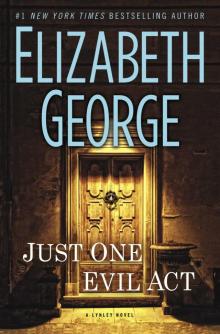 Just One Evil Act
Just One Evil Act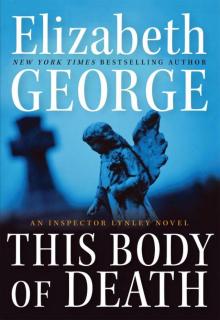 This Body of Death
This Body of Death The Edge of the Water
The Edge of the Water For the Sake of Elena
For the Sake of Elena Believing the Lie
Believing the Lie The Edge of the Shadows
The Edge of the Shadows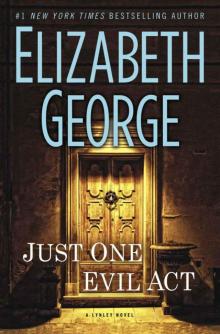 Just One Evil Act: A Lynley Novel
Just One Evil Act: A Lynley Novel In Pursuit of the Proper Sinner
In Pursuit of the Proper Sinner A Moment on the Edge:100 Years of Crime Stories by women
A Moment on the Edge:100 Years of Crime Stories by women Elizabeth I
Elizabeth I I, Richard
I, Richard A Traitor to Memory
A Traitor to Memory Missing Joseph
Missing Joseph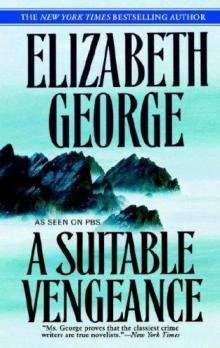 A Suitable Vengeance
A Suitable Vengeance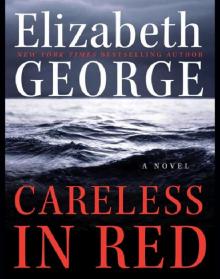 Careless in Red
Careless in Red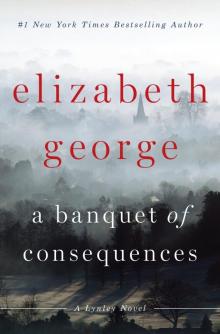 A Banquet of Consequences
A Banquet of Consequences Playing for the Ashes
Playing for the Ashes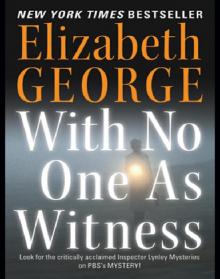 With No One As Witness
With No One As Witness Deception on His Mind
Deception on His Mind The Best American Mystery Stories 2016
The Best American Mystery Stories 2016 A Great Deliverance
A Great Deliverance In the Presence of the Enemy
In the Presence of the Enemy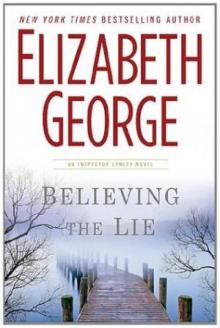 Believing the Lie il-17
Believing the Lie il-17 The Edge of the Light
The Edge of the Light SW01 - The Edge of Nowhere
SW01 - The Edge of Nowhere A Place of Hiding
A Place of Hiding What Came Before He Shot Her il-14
What Came Before He Shot Her il-14 Payment In Blood
Payment In Blood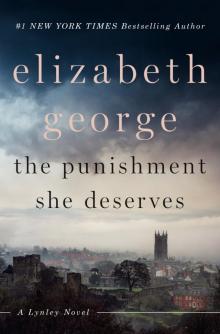 The Punishment She Deserves
The Punishment She Deserves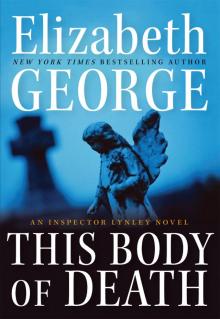 This Body of Death: An Inspector Lynley Novel
This Body of Death: An Inspector Lynley Novel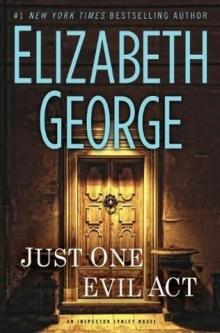 Just One Evil Act il-18
Just One Evil Act il-18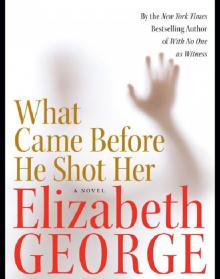 What Came Before He Shot Her
What Came Before He Shot Her Missing Joseph il-6
Missing Joseph il-6